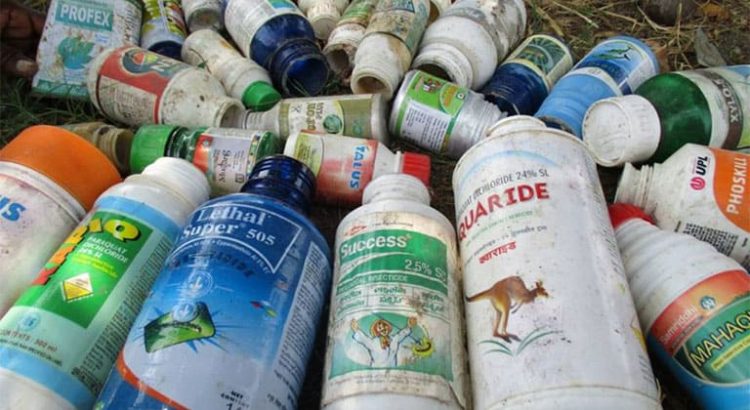On the eve of the upcoming 3rd Open Ended Working Group of the Strategic Approach to International Chemicals Management (SAICM), PAN redoubles its call for a global legally binding mechanism for the lifecycle management of pesticides, either as a new standalone treaty or as a legally binding protocol within a new overarching chemicals framework to phase out Highly Hazardous Pesticides (HHPs).
PAN expresses its deep concern that SAICM has failed to achieve sound management of pesticides and that pesticide poisoning continues in countries all around the world. PAN is releasing updated versions of two documents underlining the strong need for a legally binding treaty to ban HHPs. These are a PAN International List of Highly Hazardous Pesticidesi and a PAN International Consolidated List of Banned Pesticidesii. These two documents together show the large numbers of hazardous pesticides used around the world and the very uneven nature of regulation of hazardous pesticides around the globe.
An example illustrating such uneven regulation of pesticides is the highly toxic pesticide monocrotophos. Of the 154 countries for which information was available for the Consolidated List of Banned Pesticides, at least 112 have banned the insecticide monocrotophos, but its use in other countries continues to harm many people. It was responsible for killing 23 school children in India in 2013, implicated in the deaths of cotton growers in India in 2018, and in numerous other poisonings – despite the WHO calling on India to ban it 10 years ago. This is just one example of a HHP that should have been banned long ago, but remains in use and continues to poison people in countries where it is still used. PAN asks that companies still manufacturing monocrotophos should stop its manufacture and all remaining countries should ban it.
This situation occurs in many countries around the world, and Ms. Maimouna Diene, Director of PAN Africa says, “In many African countries we see high rates of poisonings of farmers and communities by HHPs. It is not possible to adequately protect communities, as well as their air, soil and water unless a legally binding mechanism for regulating HHPs is developed.”
Ms. Sarojeni Rengam, Executive Director of PAN Asia Pacific (PANAP) echoes this frustration and says “The continued use of HHPs in Asian countries causes widespread poisonings of children, farmers, women and agricultural workers. Recently PANAP and partners interviewed 2,025 respondents in 7 countries, and found that 7 out of 10 people interviewed were poisoned by pesticides.iii Rural people are poisoned by pesticides such as paraquat, lambda-cyhalothrin, chlorpyrifos and glyphosate.” She expressed dismay at the lack of action to prevent occupational poisonings and said “Continuing the sad saga of occupational pesticide poisonings of agricultural workers, a record number of such cases were reported last year in the Yavatmal district in Maharashtra state of India.”
Mr. Javier Souza, Regional Coordinator of PAN Latin America says “The use of HHPs in agriculture has led to frequent exposure and accidental poisoning of children throughout Latin America, for example when pesticide applications are made near schools or homes. Empty pesticide containers are discarded in the fields and rivers, contaminating the drinking water and increasing the plastic pollution of the sea because the users do not return them to their manufacturers, often violating current regulations.”
The lack of accountability of transnational pesticide corporations for the HHPs they produce and sell, especially in the Global South, led Ms. Susan Haffmans Executive Director of PAN Germany to say “It is absolutely unethical that European countries like Germany, Switzerland, France and U.K. continue to export pesticides banned for use in these countries due to their toxicity. The exports to countries in the Global South continue to put communities there in danger from the hazards of exposure to HHPs.”
Ms. Kristin Schafer, Executive Director of PAN North America added “The consolidation of the pesticide industry has created giant corporations that have no interest in voluntary control measures, and put profits above all else. Years of evidence show us that these corporate actors aggressively undermine policies that protect public health and the environment. It’s time for the global community to act.”
PAN International calls on the global community to step up to the challenge and protect people across the world from HHPs by putting in place a legally binding treaty against HHPs.
Available for interview:
Dr. Meriel Watts, PAN Asia Pacific +64-21-1807830; meriel@merielwatts.net
Ms. Susan Haffmans, PAN Germany susan.haffmans@pan-germany.org, +49(0)40-3991910-25
Ms. Sarojeni Rengam, PAN Asia Pacific, sarojeni.rengam@panap.net
Javier Souza Casadinho, PAN Latin America, javierrapal@yahoo.com.ar ,+11 15 3617 1782
Ms. Kristin Schafer, PAN North America kristins@panna.org
Ms. Maimouna Diene, PAN Africa maimounadiene@pan-afrique.org
__________________________________
i The PAN International List of Highly Hazardous Pesticides is available at: http://pan-international.org/wp-content/uploads/PAN_HHP_List.pdf
ii The PAN International Consolidated List of Banned Pesticide is available at: http://pan-international.org/pan-international-consolidated-list-of-banned-pesticides/
iii Rights and Poisons is available at: https://panap.net/2018/10/of-rights-and-poisons-accountability-of-the-agrochemical-industry/








Discussion about this post